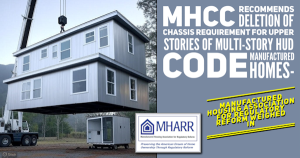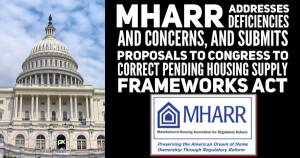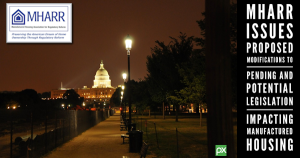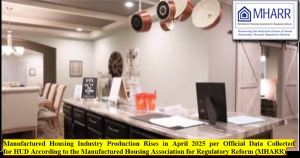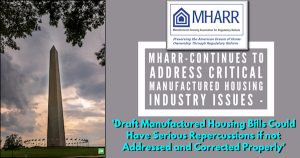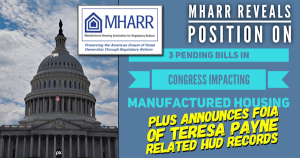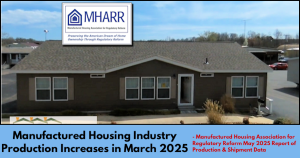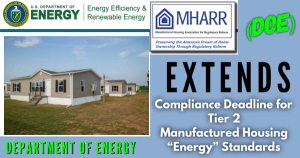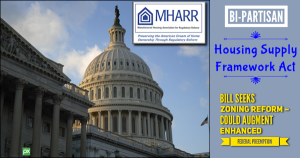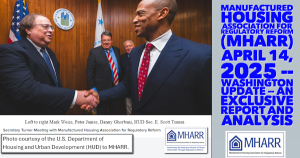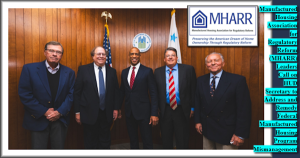Manufactured Housing Association for Regulatory Reform (MHARR) Engagement with White House Expands
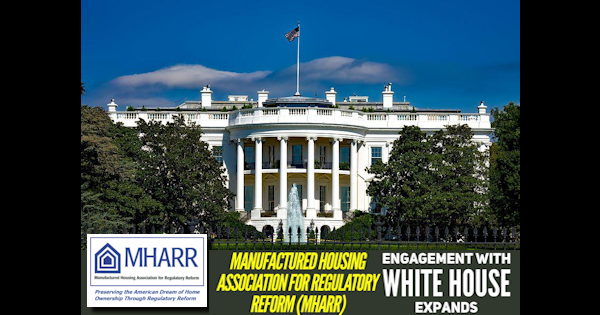
Following-up on a February 14, 2022 meeting with the White House Council on Environmental Quality’s (CEQ) Director for Housing Efficiency see, memorandum attached, MHARR has been invited to participate in an April 20, 2022 “listening session” being conducted by CEQ’s federal Manufactured Housing Task Force. The “listening session” will include multiple federal agencies connected with the federal Task Force, as well as other HUD Code industry participants.
The April 20, 2022 meeting is slated to include participants from HUD, the Federal Housing Finance Agency (FHFA), the Veterans Administration, the Department of Energy (DOE), the Department of Agriculture, the Treasury Department, the Environmental Protection Agency, the Office of Management and Budget and other federal agencies. Among other things, the Task Force will address two key post-production issues that have devastated the growth, development and evolution of the manufactured housing market, as stressed by MHARR in its initial February 14, 2022 meeting with CEQ – i.e., increasing the availability of personal property financing for manufactured homes and a robust, fully-competitive manufactured housing consumer financing market through proper federal support, and eliminating state and local zoning and placement barriers that discriminatorily restrict or exclude manufactured housing. More broadly, the Manufactured Housing Task Force has been constituted to “address market and regulatory barriers to manufactured housing as an affordable, equitable and accessible housing option, with a particular focus on financing” consistent with the affordable housing goals and priorities of the Biden Administration.
Beyond these core financing and availability issues, it also appears that the Task Force will have a role with respect to energy matters, as indicated by the designation of DOE as one of its co-chairs. MHARR will, therefore, seek to ensure that the Task Force is fully apprised of the negative, exclusionary, unnecessary and extremely costly impacts that the pending DOE manufactured housing energy rule will inevitably have on both the HUD Code market and on American consumers of affordable manufactured housing.
According to the invitation received by MHARR, the Task Force is currently planning on conducting a series of four listening sessions overall, in order to promote and facilitate the utilization of affordable manufactured housing in accordance with the Biden Administration’s housing policies. MHARR plans to fully participate in these sessions by all available means, and will also submit written comments to the Task Force as appropriate.
We shall continue to keep you apprised of the activities of the White House Task Force and MHARR’s continuing efforts to advance manufactured housing as part of the Biden Administration’s affordable housing activities.

Following-up on a February 14, 2022 meeting with the White House Council on Environmental Quality’s (CEQ) Director for Housing Efficiency see, memorandum attached, MHARR has been invited to participate in an April 20, 2022 “listening session” being conducted by CEQ’s federal Manufactured Housing Task Force. The “listening session” will include multiple federal agencies connected with the federal Task Force, as well as other HUD Code industry participants.
The April 20, 2022 meeting is slated to include participants from HUD, the Federal Housing Finance Agency (FHFA), the Veterans Administration, the Department of Energy (DOE), the Department of Agriculture, the Treasury Department, the Environmental Protection Agency, the Office of Management and Budget and other federal agencies. Among other things, the Task Force will address two key post-production issues that have devastated the growth, development and evolution of the manufactured housing market, as stressed by MHARR in its initial February 14, 2022 meeting with CEQ – i.e., increasing the availability of personal property financing for manufactured homes and a robust, fully-competitive manufactured housing consumer financing market through proper federal support, and eliminating state and local zoning and placement barriers that discriminatorily restrict or exclude manufactured housing. More broadly, the Manufactured Housing Task Force has been constituted to “address market and regulatory barriers to manufactured housing as an affordable, equitable and accessible housing option, with a particular focus on financing” consistent with the affordable housing goals and priorities of the Biden Administration.
Beyond these core financing and availability issues, it also appears that the Task Force will have a role with respect to energy matters, as indicated by the designation of DOE as one of its co-chairs. MHARR will, therefore, seek to ensure that the Task Force is fully apprised of the negative, exclusionary, unnecessary and extremely costly impacts that the pending DOE manufactured housing energy rule will inevitably have on both the HUD Code market and on American consumers of affordable manufactured housing.
According to the invitation received by MHARR, the Task Force is currently planning on conducting a series of four listening sessions overall, in order to promote and facilitate the utilization of affordable manufactured housing in accordance with the Biden Administration’s housing policies. MHARR plans to fully participate in these sessions by all available means, and will also submit written comments to the Task Force as appropriate.
We shall continue to keep you apprised of the activities of the White House Task Force and MHARR’s continuing efforts to advance manufactured housing as part of the Biden Administration’s affordable housing activities.


